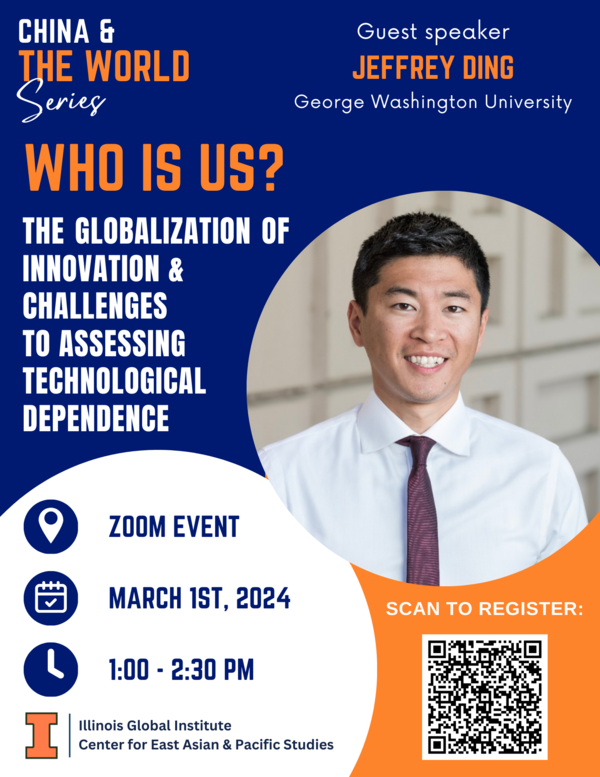
CEAPS/IGI China and the World Series | Jeffrey Ding "Who is Us?: The Globalization of Innovation and Challenges to Assessing Technological Dependence"
- Event Type
- Lecture
- Sponsor
- Hosted by: Center for East Asian and Pacific Studies | Co-sponsored by: Illinois Global Institute, Center for African Studies; Center for Global Studies, Center for Latin American and Caribbean Studies; Center for South Asian and Middle Eastern Studies; European Union Center; Lemann Center for Brazilian Studies; Program in Arms Control and Domestic and International Security; Russian, East European, and Eurasian Center; and Women and Gender in Global Perspectives Program.
- Date
- Mar 1, 2024 1:00 - 2:30 pm
- Speaker
- Jeffrey Ding (Assistant Professor of Political Science, George Washington University)
- Registration
- Zoom Webinar Registration
- Contact
- Yuchia Chang
- yuchia@illinois.edu
- Views
- 336
- Originating Calendar
- CEAPS Events Calendar
How do states assess technological self-sufficiency in a globalizing world? To sustain long-term growth and limit foreign dependency, rising powers pursue domestic sources of technological innovation. In recent decades, however, the hybridization of innovation — marked by increased cross-border financial flows and expanded mobility of high-skilled workers — has challenged emerging economies’ capacity to determine what constitutes “independent” or “indigenous” innovation. Borrowing Robert Reich’s notation, the grounds for debate over “who is us” have fundamentally shifted. Dr. Ding's research posits that, compared to previous generations, rising powers today adopt more malleable boundaries for the corporate actors included within indigenous innovation because their technology ecosystems are more reliant on transnational technical communities and foreign direct investment. Case studies of how policymakers evaluated independent innovation in China, India, and Japan provide empirical support for the theory. These comparisons, across time and between states, illustrate how structural changes in the global economy have made it more difficult for rising powers to draw lines between “domestic” and “foreign” companies, resulting in unsettled assessments of independent innovation. This presentation contributes to academic and policy debates about the consequences of economic dependence, the efficacy of high-profile industrial policies, and how developing states manage the challenges of globalization.
Jeffrey Ding is an Assistant Professor of Political Science at George Washington University. Previously, he served as a postdoctoral fellow at Stanford's Center for International Security and Cooperation. His research agenda covers emerging technologies and international security, the political economy of innovation, and China's scientific and technological capabilities. His book manuscript investigates how past technological revolutions influenced the rise and fall of great powers, with implications for U.S.-China competition in emerging technologies like AI. Dr. Ding’s research has been published or is forthcoming in European Journal of International Security, Foreign Affairs, International Studies Quarterly, Review of International Political Economy, and Security Studies, and his work has been cited in The Washington Post, The Financial Times, and other outlets. He received his PhD in 2021 from the University of Oxford, where he studied as a Rhodes Scholar, and earned his B.A. in 2016 at the University of Iowa.
This talk is part of the 2023-2024 Illinois Global Institute "China and the World" Series co-sponsored by the Center for African Studies, Center for East Asian and Pacific Studies, Center for Global Studies, Center for Latin American and Caribbean Studies, Center for South Asian and Middle Eastern Studies, European Union Center, Lemann Center for Brazilian Studies, Program in Arms Control and Domestic and International Security, Russian, East European, and Eurasian Center, and Women and Gender in Global Perspectives Program.
Related Events:
2/7, 12 pm | CGS - Lizhi Liu "The Rise of Data Politics: Digital China and the World”
2/22, 4 pm | EUC - Tomasz Kamiński “Cities as Actors in the EU Policy towards China”
3/26, 12 pm | REEEC - Joseph Torigian "Prestige, Manipulation, and Coercion: Elite Power Struggles in the Soviet Union and China after Stalin and Mao"
4/9, 12 pm | CSAMES - Zaynab El Bernoussi “China and the Middle East through the Lens of the Halal Diplomacy”